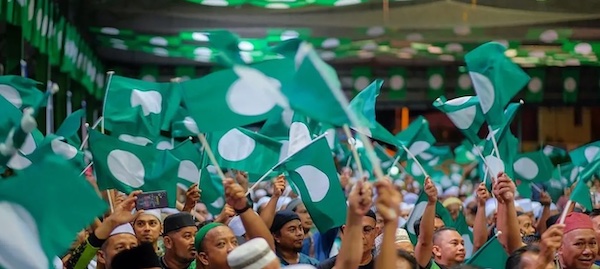The Power of PAS

Generations in the making
Murray Hunter
The Parti Islam Se-Malaysia (PAS) received 2,259,353 votes in the 2022 general election. This is 14.5% of those who came out to vote in GE15, and when combined with their Perikatan Nasional (PN) counterpart Bersatu, made up 30.07% of the aggregate vote. PAS won 43 seats in the national parliament, which made PAS the single largest party in the Dewan Rakyat.
In the coming state elections, there is every probability PAS may win clean sweeps in both Kelantan and Terengganu. PAS may also win with a supermajority in Kedah.
Communities are the heart of PAS
Unlike other political parties, PAS is based upon community kampongs, along the east coast, and from Perlis down to Johor.
PAS kampongs can be easily identified by the iconic PAS flags flying throughout the kampongs. These kampongs consist of a mosque, a school, a tadika, or kindergarten, and a PAS community shop. These kampongs are usually very close-knit relationship wise, where the dress code has that Arabic-Malay theme to it. These communities are organized upon a cooperative basis, with regular kampong meetings.
As such, PAS communities have powerful social norms, which the vast majority conform to. They respect the kampong leaders, and usually follow without conjecture.
These kampongs have been developing for decades. PAS kampongs follow the traditional Malay social hierarchy, where the natural leaders are religious teachers, who have taken over from their father, and grandfather before them. This form of organization stretches from Southern Thailand to Ambon in Indonesia.
In Kelantan and Terengganu, state authorities have added a system of state appointed Penghulu Kampongs, or village leaders throughout communities living in PAS governed states. These penghulus liaise with party political machinery. They coordinate, collect and disseminate information between the kampong and party.
Pas has put much emphasis on developing an extensive education base. This starts with preschool. PASTI schools, as they are called, have been set up across the peninsula and have around 125,000 enrolments. After PASTI schools, children can move onto religious primary schools, called SRITI schools. After primary school, PAS is developing secondary schools, called SRITI schools.
This has created a parallel education system, alongside the federal government schools. Although PAS doesn’t have its own university, most campuses of public universities have a Persatuan Mahasiswa Islam, or Muslim Student Association.
Using state apparatus to support PAS theology
In PAS controlled states, the state administrative apparatus disseminates PAS theology to mosques. State religious departments train imans, religious teachers, and other state employees to send out the message of PAS. PAS theology is disseminated through Friday sermons, or kuliah each week.
This creates a PAS culture, and greatly influences individual mindset, through a sense of conformity, within the community.
From kampong to nation
PAS as a political party is very tech-savvy, and utilizes social media as a platform to reach the youth. PAS also organizes youth orientated events for the young to participate in. These create a deep sense of camaraderie, and make connections through networking. This goes much further than the political paradigm.
The above can be utilized when elections arise. Communities will be utilized for campaigns, and the youth reached through PAS activity groups. The state machinery puts of PAS election propaganda through mosques, while social media can reach targeted groups across the whole country.
Over the years, PAS has learnt well from past coalition partners how to campaign. Through the tie up with PKR and the DAP through the Pakatan Rakyat, and Perikatan Nasional (PN), PAS has been able to develop very sophisticated electoral campaigning techniques. These collaborations have taken PAS from the east coast to across the whole peninsula now.
Today, PAS can be considered the senior partner of PN, and will be contesting the majority of the seats in the coming state elections. PAS will leverage itself with Bersatu to approach and gain support from the cohort of Malay voters, in semi urban areas in Selangor and Penang, where it has never won before. To expand the party’s electoral influence, PAS must compete against PKR, and Amanah to a lesser extent, to win the votes of the ‘undecided group’ of Malays, who are nether pro-PAS or Pro-PH. This represents up to 15% of constituency voters.
The primary objective of PAS is to win Selangor, where if it did, could go about implementing the formula it has used successfully in the states it has been governing. PAS knows over time its methods can win conformity from many Malays. This would facilitate PAS becoming the major political party, over the long-term.
The big mistake is thinking PAS is an extremist party. PAS apparatchiks already exist within the federal bureaucracy, schools, universities, and JAKIM. The PAS leadership knows it must reach the Malay cohort outside the Malay heartlands and win enough support to win the federal government in the long-term. PAS campaigns upon theology, and not policy. This is why the Anwar administration is trying to show its Islamic credentials.
The only match for PAS was UMNO in the Malay heartlands. However, UMNO is suffering mass-disillusionment with the party leadership, which was reflected in their poor performance in GE15.
For PAS, there is an optimistic political future.

